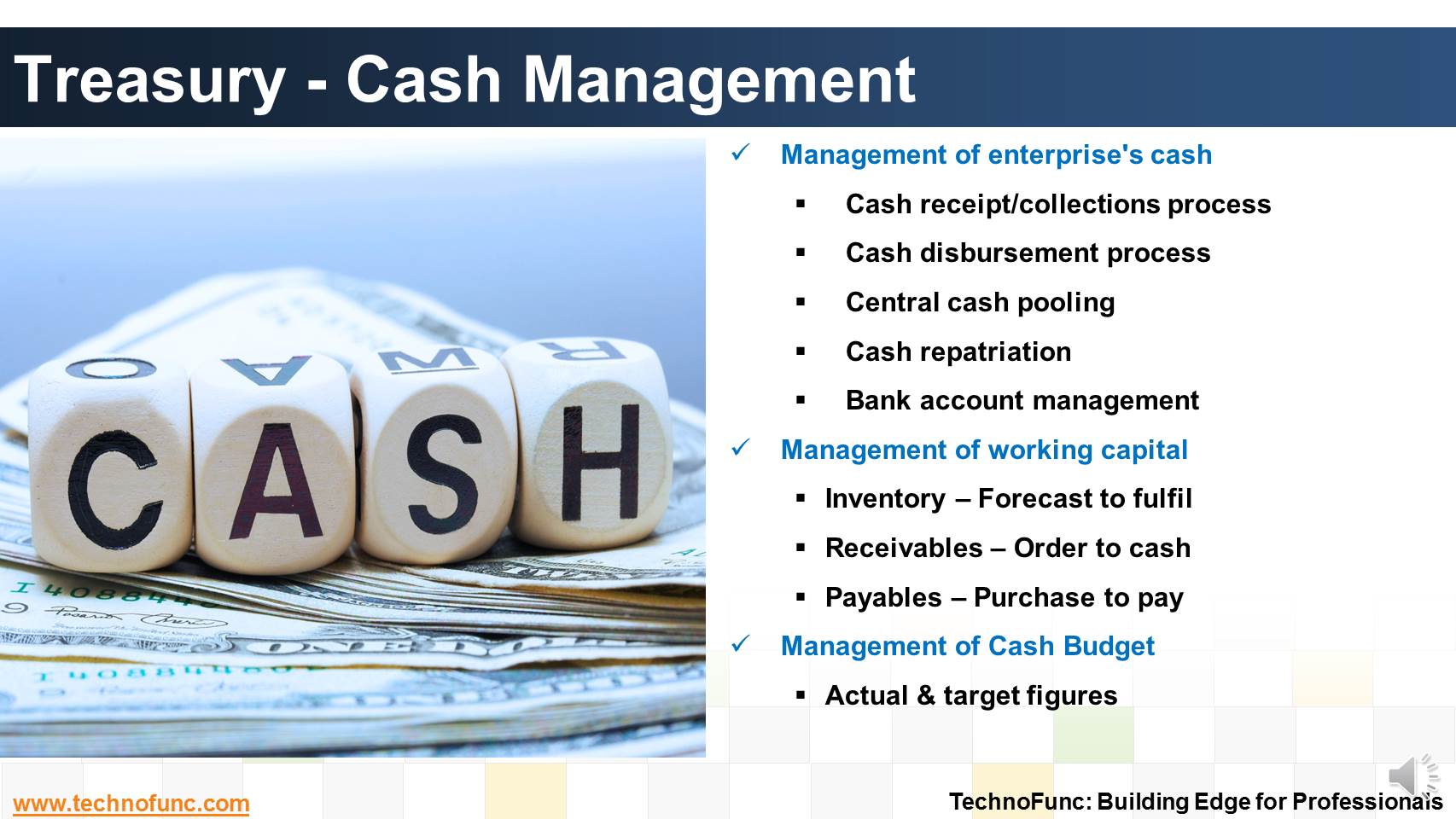- Home
- Business Processes
- Industry Knowledge
- Aerospace Industry
- Automotive Industry
- Banking Domain
- BFSI Industry
- Consumer/ FMCG Industry
- Chemicals Industry
- Engineering & Construction
- Energy Industry
- Education Domain
- Finance Domain
- Hospitality Domain
- Healthcare Industry
- Insurance Domain
- Retail Industry
- Travel and Tourism Domain
- Telecom Industry
- Leadership Skills
- eLearning
- Home
- Business Processes
- Cash Management
- Treasury - Cash Management
Treasury - Cash Management
The Cash Management component ensures that the enterprise has sufficient liquidity for payments that are due and to monitor payment flows. Learn how treasury plays an important role in cash management for the enterprise.
The Cash Management component ensures that the enterprise has sufficient liquidity for payments that are due and to monitor payment flows.
The cash position and liquidity forecast functions are used to track the movements on the various accounts.
It is very important to correctly assess local and international liquidity needs and cash availability.
Management of enterprise's cash
- Treasury function manages liquidity by accessing and using data from multiple systems and processes.
- With centralized cash management at enterprise level there is greater transparency into global cash flow that helps in optimizing Cash receipt and disbursement process to improve efficiencies
- Central in-house cash control reduces dependency on external funding and improves processes for transferring cash to operations worldwide.
- Position transparency and liquidity management is achieved through position management like Central cash pooling
- Cash and capital repatriation is also managed under treasury function.
Management of working capital
- Inventory – Forecast to fulfil
- Analyze sales forecast processes and evaluate production and material execution plans
- Receivables – Order to cash
- Enterprise wide visibility and consistency throughout the order to cash process by generating value from credit and collections
- Payables – Purchase to pay
- Vendor payments management and analyze company expenditure and spending patterns
Cash Budget Management
- The objective of the Cash Budget Management component is to monitor and secure liquidity in the medium to long term.
- It delivers the actual and target figures for reviewing plans, analyzing deviations and as a basis for future planning.

-
Cash Clearing – Accounting Entries
The Cash Clearing process enables you to track amounts that have actually cleared your bank. Learn the steps and accounting entries that gets generated during the cash clearing process.
-
Unravel the mystery behind clearing. Why we use clearing accounts. Find the relevance of word "Clearing" in business context.
-
What is Account Reconciliation?
Before you understand the Bank Reconciliation Process it is important to understand what is account reconciliation and why it is carried out.
-
Many different accounts are used in finance. Understand the representation and nature of clearing account in context of accounting, finance and ERP Systems.
-
Learning objectives for this lesson are: Meaning of Order to Cash Process; Sub Processes under Order to Cash; Process Flow for Order to Cash; Key Roles & Transactions; Key Setups/Master Data Requirements.
-
In the previous article we talked about the meaning of the account reconciliations. Now as you now the definition of account reconciliation, in this article let us see why it is carried out.
-
The Cash Management component ensures that the enterprise has sufficient liquidity for payments that are due and to monitor payment flows. Learn how treasury plays an important role in cash management for the enterprise.
-
How the inflow and outflow of cash is linked to the operating cycles of the business? Learn the cash management process in an enterprize and it's key components.
-
Suspense and clearing accounts resemble each other in many respects but there exists important fundamental difference between the two. Read more to explore these differences.
-
Treasury Management - Benefits
Effectively using treasury management with cash management and trade finance products brings tangible benefits to both corporates and financial institutions. Let us discuss some tangible benefits of treasury function.
Related Links
You May Also Like
-
Treasury has increasingly become a strategic business partner across all areas of the business, adding value to the operating divisions of the company. Managing activities that were traditionally carried out within the general finance function. Learn about the drivers for this change.
-
Treasury Management - Benefits
Effectively using treasury management with cash management and trade finance products brings tangible benefits to both corporates and financial institutions. Let us discuss some tangible benefits of treasury function.
-
The objective of funding Management is to implement strategies that lead to the best borrowing rates and lower investment costs. Learn how treasury aids in loans and investment management functions.
-
The Cash Management component ensures that the enterprise has sufficient liquidity for payments that are due and to monitor payment flows. Learn how treasury plays an important role in cash management for the enterprise.
-
Although there is no straight forward answer to the question, how to best organize a treasury function, this article provides an generic view of the way large MNCs creates departments or sub-functions within the treasury function.
-
The terms Treasury Management and Cash Management are sometimes used interchangeably, while, in fact, the scope of treasury management is larger and includes funding and investment activities as well. Learn all about Treasury Management here!
-
The objective of Financial risk management is to protect assets and cash flows from any risk. Treasury function works to accurately assess financial risks by identifying financial exposures including foreign exchange, interest rate, credit, commodity and other enterprise risks. Learn about the various risks that are managed by treasury.
-
Technology has enabled the treasury function by providing various solutions to manage it's complicated tasks. This article explains various types of treasury management systems available in the market.
-
Treasury Management - Functions
Treasury management has become an specialized function. Treasury function helps in managing the Risk-return profile as well as the tax-efficiency of investment instruments. In larger firms, it may also include trading in bonds, currencies and financial derivatives. Learn about the various tasks, activities and imperatives, undertaken by treasuries in in today's context.
Explore Our Free Training Articles or
Sign Up to Start With Our eLearning Courses

About Us
Learning
© 2023 TechnoFunc, All Rights Reserved

















